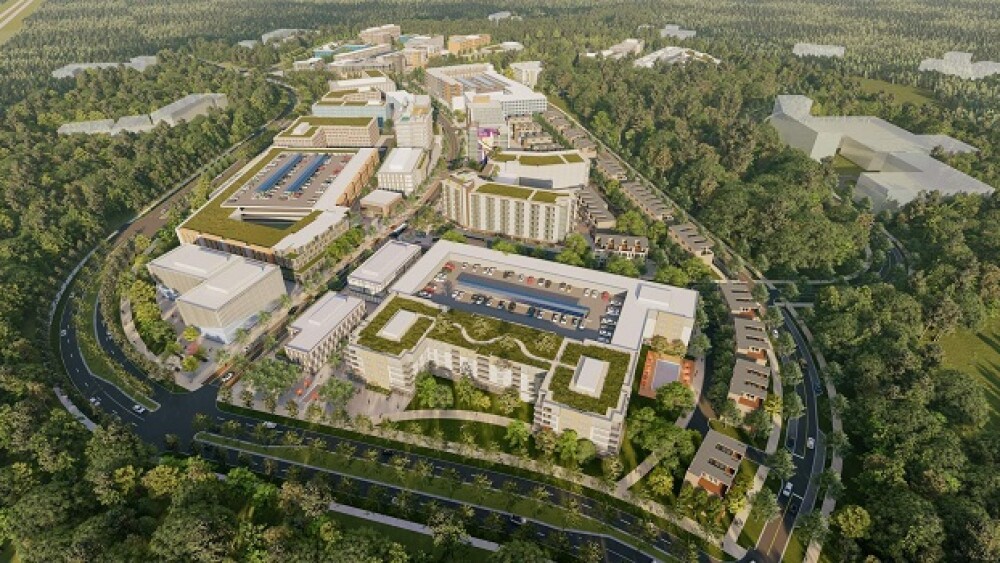Two new developments for lab and office space are expected to add over 2,000 acres of space in Atlanta to accommodate the life science industry’s rapid growth.
Pictured: 3D rendering of the future of the Rowen development/Courtesy Rowen
Move over, Boston investors: universities and biopharma companies alike are coming together to turn Atlanta into the next major hub for the life sciences.
This was the primary topic of discussion at a Brunch & Learn event hosted by the Metro Atlanta Chamber and life sciences venture capital firm Portal Innovations on Friday.
John Flavin, founder and CEO of Portal Innovations, kicked off the event by speaking about Portal’s investment in Science Square, an 18-acre research district being developed to provide office and laboratory space right next to Georgia Tech’s campus in the heart of Atlanta.
Flavin said Portal has partnered with community leaders, universities, venture capital firms and pharmaceutical companies to bring lab infrastructure and a life sciences ecosystem to the city.
“If you’re going to build a sustainable ecosystem, it’s important to have a central point where people can collaborate . . . and that’s why Portal is here and opening beautiful Science Square,” Flavin said at the event. “Our 10-year vision is to help Atlanta become a biotech hub for the southeast.”
A Development Frenzy
Portal has partnered with Trammell Crow, a commercial real estate developer, as well as universities across the state, including Georgia Tech, the University of Georgia and Emory University. Science Square will be home to myriad life science companies, including Vero Biotech, GATV Innovation Labs and Abbott’s St. Jude Medical.
While 18 acres may sound like plenty of room, Mason Ailstock, president of the Rowen Foundation, said it is not enough to keep up with the city’s rapid growth. The Rowen Foundation is a nonprofit organization focused on developing a site with more than 2,000 acres of space in the metro-Atlanta area available for companies in the medical, agriculture and environmental industries.
Ailstock told BioSpace he was inspired by Research Triangle Park in North Carolina, where he served as chief operating officer. He said he knew the life sciences industry in Atlanta would thrive with a similar space.
“We’re positioned for metro Atlanta to be the rising place for the life sciences in the country, because we have this diversity of options for companies to be able to plug in and grow,” Ailstock said.
Like Science Square, Rowen’s board of directors includes representatives from universities across the state. State leaders broke ground on the development on Dec. 9, and Ailstock said he is already selling spaces. Phase one of Rowen’s development, expected to wrap up in Q1 of 2024, will see the opening of the first 800 acres of real estate.
Ailstock added that he doesn’t expect the development to end during his lifetime.
Instead, he wants his efforts to be only the beginning of a community that will continue to grow.
“We’re curating a community,” Ailstock said. “We’re not just selling dirt to anybody; we’re looking for partners that want to be a part of this bigger picture.”
In total, Science Square is expected to create more than 5,000 job opportunities, and Rowen is expected to create 80,000 to 100,000 new jobs at full buildout. Ailstock said Rowen is also expected to bring in an additional $9 billion to Georgia’s economy each year.
Why Atlanta?
According to a CBRE report released in April, Atlanta had one of the fastest-growing life sciences workforces in the U.S. from 2019 to 2022.
The city also came in fourth place for R&D job growth, with a growth rate of 44%, according to the report, which estimated a total of about 18,200 life science employees in Atlanta. Nearly 5,600 of these were in R&D.
Ángel Cabrera, president of Georgia Tech, spoke on a panel at Friday’s event. He said this growth is largely due to the city’s academic research.
He said Atlanta is one of only three cities in the U.S. to have three R1 universities—universities that receive the highest ranking for research in the Carnegie Classification of Institutions of Higher Education.
“We are convinced that Atlanta can emerge as one of the hottest hubs of innovation at this point,” Cabrera said. “We have the science; we just need to create that space, that square, that ecosystem where these ideas can translate into the world, into new solutions.”
He also emphasized the importance of publicizing the city’s significance in the industry.
“We need to make sure the entire world knows we’re up to something.”





